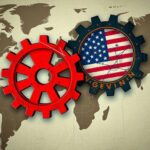Politics
AFP, ASIA, BEIJING, CHEN, CHEN WENLING, CHINA, CHINA CENTER FOR INTERNATIONAL ECONOMIC EXCHANGES, COMMERCE MINISTRY, DONALD TRUMP, FOREIGN MINISTRY, GEOPOLITICS, MEXICO, NATIONAL SECURITY, NORTH AMERICA, TARIFFS, TERRITORIAL DISPUTES, TRUMP, UNITED STATES, US, US-CHINA RELATIONS, WASHINGTON
Clara Montgomery
China Opposes New U.S. Tariffs, Promises Countermeasures to Protect Interests
China has expressed strong opposition to the new U.S. tariffs, threatening countermeasures while criticizing Washington’s unilateral actions. These tariffs, especially those targeting China, jeopardize global economic stability and harm both nations’ interests. Despite the tension, the two sides maintain communication, though the likelihood of an escalated trade conflict poses risks to China’s economic recovery and U.S. standing in international trade.
On Thursday, China expressed strong opposition to the sweeping new tariffs imposed by the United States on its exports, pledging to enact “countermeasures” to safeguard its rights and interests. U.S. President Donald Trump initiated a potential global trade conflict by implementing a 10 percent levy on imports worldwide, alongside harsh tariffs of 34 percent specifically targeted at China, which stands as one of the largest U.S. trading partners.
In a statement, the Chinese Commerce Ministry criticized the tariffs as contrary to international trade regulations, asserting that they severely infringe upon the legitimate interests of applicable parties. The Ministry called for an immediate cancellation of the tariffs, cautioning that they pose risks to global economic prosperity and adversely affect U.S. interests as well as international supply chains. Furthermore, Beijing accused the United States of engaging in typical unilateral bullying.
This latest round of tariffs adds to the previously imposed 20 percent duties and coincided with the Ministry’s rebuke of U.S. protectionist and bullying tactics. However, it was noted that both nations continue to communicate regarding their ongoing trade and economic disputes. The Chinese Foreign Ministry warned that protectionism leads to a dead end and highlighted the prevalent global opposition to such trade measures.
In response to U.S. tariffs, China had already instituted levies of up to 15 percent on various agricultural imports from the United States, including commodities like soybeans, pork, and chicken. Chen Wenling, Chief Economist at the China Center for International Economic Exchanges, indicated that China may consider implementing export controls on critical minerals as a retort to U.S. tariff measures, stating, “The United States has become a high-tariff nation, and its status as the flagbearer of free trade has diminished.”
The imposition of these tariffs threatens to undermine China’s fragile economic recovery, which has struggled amidst an ongoing debt crisis in the property market and continually low consumer demand. The escalation of the trade war may require China to reassess its reliance on exports, particularly given their surge to record levels in 2024.
Although Trump characterized the tariffs as “reciprocal,” experts have raised concerns about the accuracy of U.S. government claims regarding tariffs imposed by other countries. Beijing contended, “The U.S claims to have suffered losses in international trade, using so-called ‘reciprocity’ as an excuse to raise tariffs on all trade partners.” They further argued that this strategy undermines the achievements of multilateral trade negotiations.
China called for constructive dialogue to address the issues, asserting, “There is no winner in a trade war, and there is no way out for protectionism.” Historical precedence suggests that increasing tariffs fails to resolve the domestic problems faced by the United States. In addition to these tariffs on Chinese imports, the U.S. has also levied a 25 percent tax on aluminum and steel imports, with China being the world’s largest steel manufacturer, albeit not a significant exporter to the U.S.
In summary, China’s firm opposition to the recent U.S. tariffs highlights the ongoing tensions in international trade, which are exacerbated by protectionist measures. By threatening countermeasures and engaging in dialogue, China seeks to protect its economic interests while warning against the implications of a trade war. The mutual accusations of bullying and claims of economic detriment further complicate the situation, emphasizing the need for negotiation rather than confrontation. The eventual outcomes remain uncertain as both nations navigate this intricate economic landscape.
Original Source: www.mykxlg.com








Post Comment